-
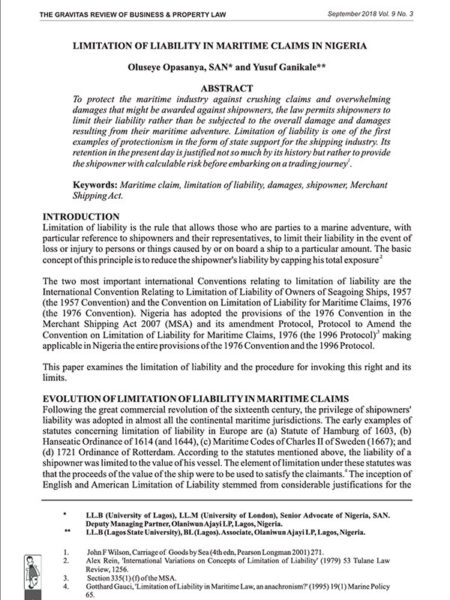
Limitation of Liability in Maritime Claims in Nigeria
0₦2,500.00Oluseye Opasanya SAN, and Yusuf Ganikale, Deputy Managing Partner and Associate respectively at Ajayi LP in their article, Limitation of Liability in Maritime Claims in Nigeria, note that to protect biliathe maritime industry against crushing claims and overwhelming damages that might be awarded against shipowners, the law permits shipowners to limit their liability rather than be subjected to hefty damages resulting from their maritime adventure. They review the provisions of the Merchant Shipping Act 2007 which domesticated the Convention on Limitation of Liability for Maritime Claims, 1976 and its amendment Protocol of 1996, Protocol to Amend the Convention on Limitation of Liability for Maritime Claims, 1976. They distinguish between limitation and liability proceedings, persons who may limit their liability, claims which are subject to limitation, conducts which may defeat limitation and creation of a Limitation Fund.
-
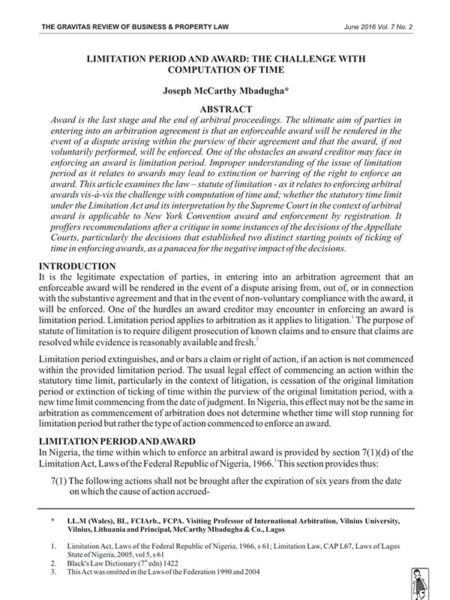
Limitation Period and Award: The Challenge with Computation of Time
0₦2,500.00Joseph Mbadugha, SAN, Visiting Professor of International Arbitration, Vilnius University, Lithuania and Principal, McCarthy Mbadugha & Co confronts a daunting issue in “Limitation Period and Award: The Challenge with Computation of Time.” He argues that as the courts have been strict in holding that, in enforcement of arbitral award, limitation period runs from the date of accrual of the original cause of action in the arbitration agreement and not from the date of the arbitral award, there could be two ways of enforcing an arbitral award with two distinct ticking clocks: enforcement of an award as a judgment of the court and enforcement as a breach of implied promise to perform a valid award. In the former, time begins to run from the date of accrual of the original cause of action that gave rise to the arbitration, while in the latter, time runs from the date the award debtor refused to perform the award.
-
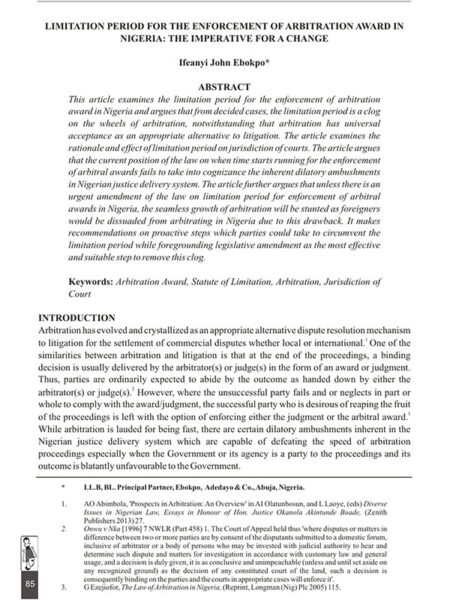
Limitation Period for the Enforcement of Arbitration Award in Nigeria: The Imperative for Change
0₦2,500.00Ifeanyi Ebokpo, Principal Partner, Ebokpo & Adedayo & Co Abuja Nigeria in his article,Limitation Period for the Enforcement of Arbitration Award in Nigeria: The Imperative for Change, examines the several modes and mechanisms for the recognition and enforcement of arbitral awards in Nigeria. He posits that the current position of the law on when time starts running for the enforcement of arbitral awards fails to take into cognizance the inherent dilatory processes in Nigerian justice delivery system. He advocates a change in the law so that the obvious drawback will not stunt the growth of arbitration.
-
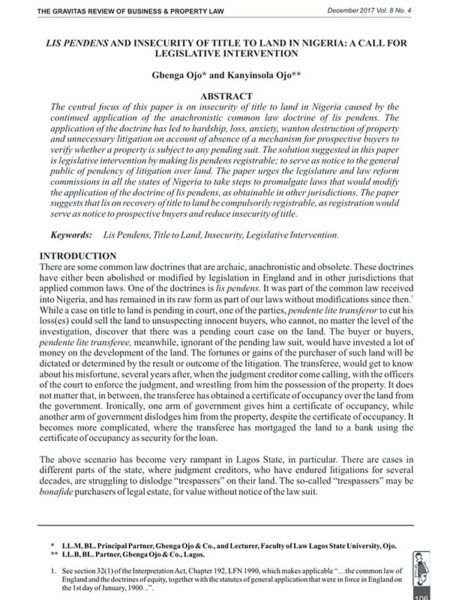
Lis Pendens and Insecurity of Title to Land in Nigeria: A Call for Legislative Intervention
0₦2,500.00Is a sale transaction pendente lite void or voidable? Gbenga Ojo, Lecturer, Lagos State University, and Kanyinsola Ojo, Partner, Gbenga Ojo & Co, in their engaging article, “Lis Pendens and Insecurity of Title to Land in Nigeria: A Call for Legislative Intervention”, review Supreme Court decisions on the nature of title transferred during litigation. They argue that the legal immunity given to a bona fide purchaser for value without notice, and the indefeasibility of title conferred on a purchaser under the (repealed) Registration of Title Law (now replaced by the Land Registration Law of Lagos State, 2015) will not avail a purchaser pendente lite. They call for compulsory registration of pending litigations on land, as done in some other jurisdictions, to serve as notice to prospective buyers, and reduce insecurity of title.
-
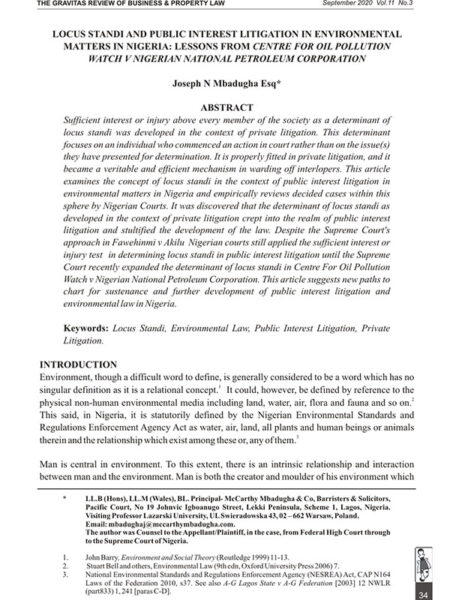
Locus Standi and Public Interest Litigation in Environmental Matters in Nigeria: Lessons from Centre for Oil Pollution Watch V Nigerian National Petroleum Corporation
0₦2,500.00Joseph Mbadugha of McCarthy Mbadugha & Co Lagos Nigeria, Visiting Professor of Lazarski University Warsaw, Poland and the Counsel to the Appellant/Plaintiff from the Federal High Court through to the Supreme Court of Nigeria in the case of Centre for Oil Pollution Watch V. Nigerian National Petroleum Corporation takes a second look at the landmark case. In his article, Locus Standi and Public Interest Litigation in Environmental Matters in Nigeria: Lessons from Centre for Oil Pollution Watch V. Nigerian National Petroleum Corporation, Mbadugha notes that ‘sufficient interest’ or ‘injury above other members of the society’, a determinant of locus standi developed in private litigation to ward off meddlesome interlopers, crept into the realm of public interest litigation with the resultant stultifying effect until the Supreme Court expanded the coast in COPW V. NNPC. He reviews decided cases in the evolution of locus standi in public interest litigation and suggests new paths for sustenance and development of public interest litigation and environmental law in Nigeria.
-
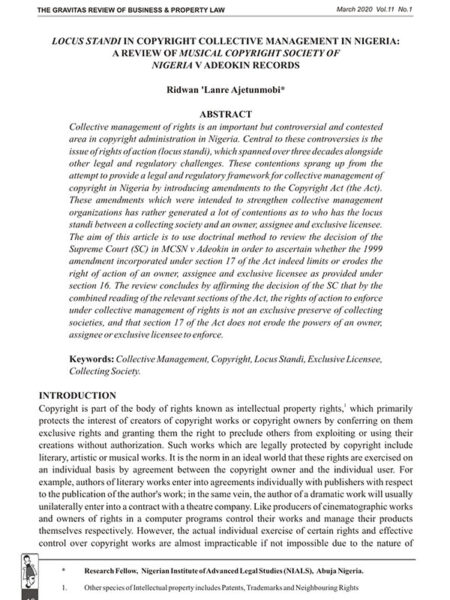
Locus Standi in Copyright Collective Management in Nigeria: A Review of Musical Copyright Society of Nigeria v Adeokin Records
0₦2,500.00Ridwan Ajetunmobi, Research Fellow at the Nigerian Institute of Advanced Legal Studies Abuja Nigeria, in Locus Standi in Copyright Collective Management in Nigeria: A Review of Musical Copyright Society of Nigeria v Adeokin Records, examines the Supreme Court decision in Adeokin against the background of the amendments to the Copyright Act in 1992 and 1999 with regard to whether the right of action in copyright infringement is exclusive to collecting societies or is available to an owner, assignee or licensee of copyrighted works.
-
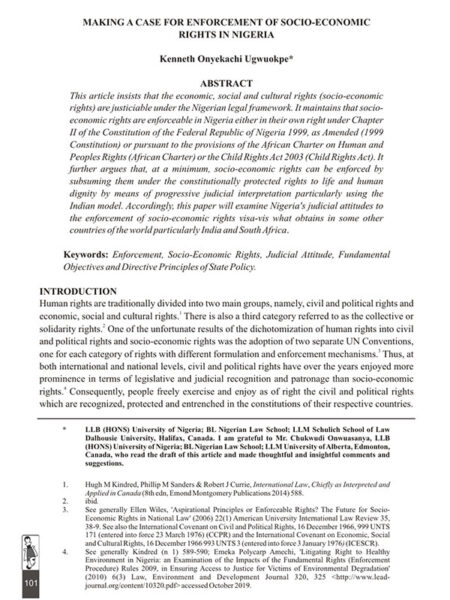
Making a Case for Enforcement of Socio-Economic Rights in Nigeria
0₦2,500.00Kenneth Ugwuokpe in his article, Making a Case for Enforcement of Socio-Economic Rights in Nigeria, insists, no doubt controversially, that the economic, social and cultural rights indicated as “fundamental objectives and directive principles of state policy” in the 1999 Constitution of Nigeria, are justiciable under the Nigerian legal framework. Kenneth argues that the socio-economic rights are enforceable in Nigeria either in their own right under Chapter II of the Constitution or pursuant to the provisions of the African Charter on Human and Peoples Rights or the Child Rights Act 2003. He further posits that, at a minimum, socio-economic rights can be enforced by subsuming them under the constitutionally protected rights to life and human dignity by means of progressive judicial interpretation, particularly using the Indian model. He examines Nigeria’s judicial attitudes to the enforcement of socio-economic rights vis-a-vis what obtains in some other countries, notably India and South Africa.
-
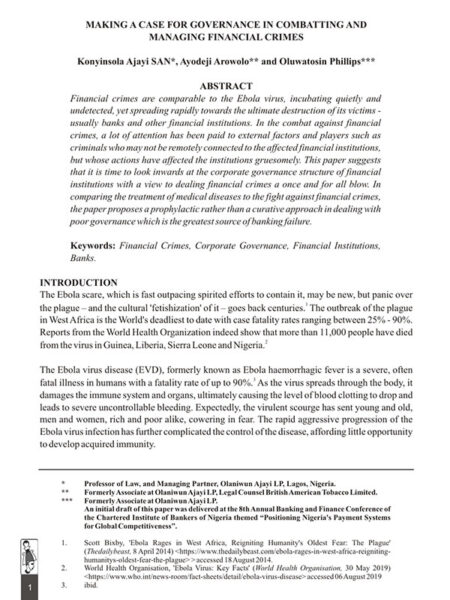
Making a Case for Governance in Combatting and Managing Financial Crimes
0₦2,500.00Professor Konyinsola Ajayi, SAN of Olaninwun Ajayi LP, Ayodeji Arowolo of British American Tobacco and Oluwatosin Phillips in their article, Making a Case for Governance in Combatting and Managing Financial Crimes compare financial crimes to a devastating disease, which incubates quietly and undetected, yet spreads rapidly towards the ultimate destruction of its victims. They argue that while advancement in IT has driven economic growth and financial inclusion, banks have become hosts for financial crimes. While considering judicial attitude to bank frauds, they conclude that just as a prophylactic treatment of diseases is preferred to curative treatment, good corporate governance in financial institutions will rein in financial crimes.
-
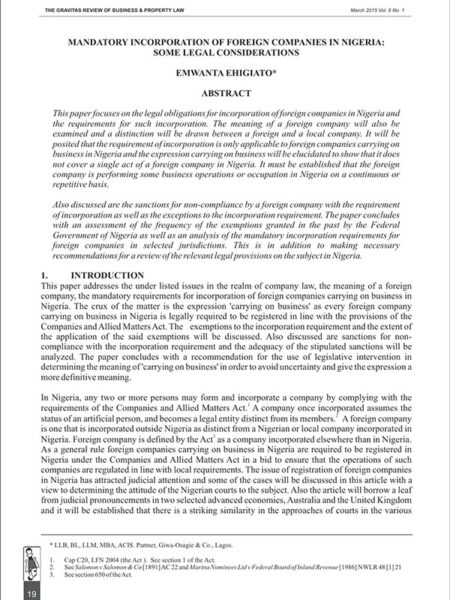
Mandatory Incorporation of Foreign Companies in Nigeria: Some Legal Considerations
0₦2,500.00Emwanta Ehigiato, Partner, Giwa-Osagie & Co takes a critical look at section 54 of the Companies and Allied Matters Act, 1990 in “Mandatory Incorporation of Foreign Companies: Some Legal Considerations”.
-
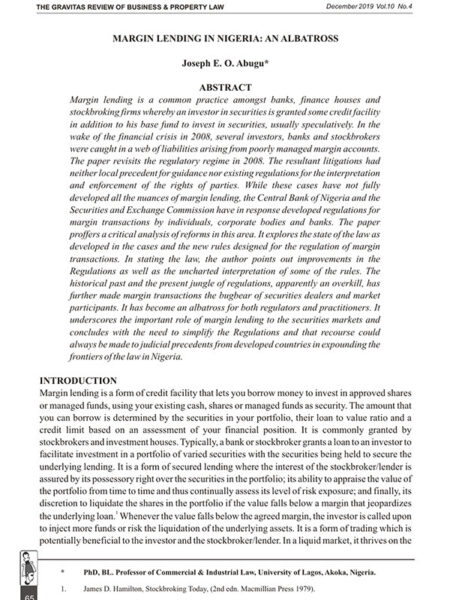
Margin Lending in Nigeria: An Albatross
0₦2,500.00Joseph Abugu, Professor of Commercial & Industrial Law, University of Lagos Akoka Nigeria in his article, Margin Lending in Nigeria: An Albatross, notes that Margin Lending is a common practice amongst banks, finance houses and stockbroking firms whereby an investor in securities is granted credit facility in addition to his base fund to invest in securities, usually speculatively. In the wake of the financial crisis of 2008, several investors, banks and stockbrokers were caught in a web of liabilities arising from poorly managed margin accounts. The resultant litigations had neither local precedent for guidance nor existing regulations for the interpretation and enforcement of rights. While the cases have not fully developed all the nuances of Margin Lending, the Central Bank of Nigeria and the Securities and Exchange Commission have in response developed regulations for margin transactions by individuals, corporate bodies and banks. Professor Abugu, in his usual inimitable style, explores the state of the law as developed in the cases and the new rules designed for the regulation of margin transactions.
-
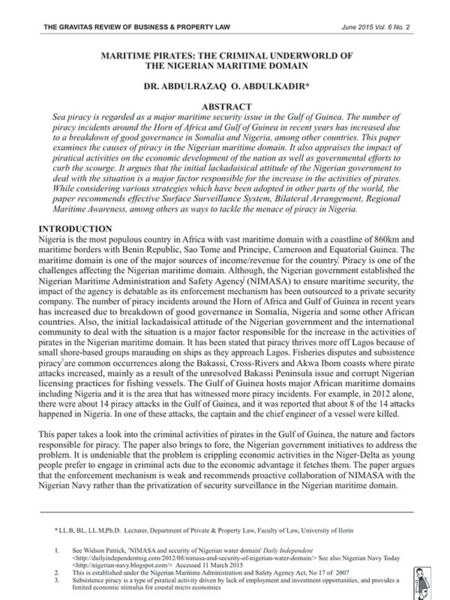
Maritime Pirates: The Criminal Underworld of the Nigerian Maritime Domain
0₦2,500.00Dr. Abdulkadir examines the causes of piracy in the Nigerian maritime domain in his article, Maritime Pirates: The Criminal Underworld of the Nigerian Maritime Domain. He also appraises the impact of piratical activities on the economic development of the nation as well as governmental efforts to curb the scourge. The article argues that the initial lackadaisical attitude of the Nigerian government to deal with the situation is a major factor responsible for the increase in the activities of pirates. While considering various strategies which have been adopted in other parts of the world, the paper recommends effective Surface Surveillance System, Bilateral Arrangement, Regional Maritime Awareness, among others as ways to tackle the menace of piracy in Nigeria
-
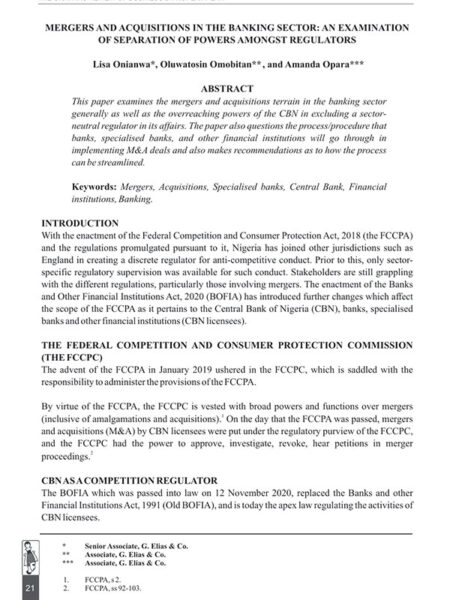
Mergers and Acquisitions in the Banking Sector: An Examination of Separation of Powers Amongst Regulators
0₦2,500.00Lisa Onianwa, Oluwatosin Omobitan, and Amanda Opara, all of G. Elias & Co, in their article, Mergers and Acquisitions in the Banking Sector: An Examination of Separation of Powers Amongst Regulators, examine the mergers and acquisitions (M&A) terrain in the banking sector and the overreaching powers of the Central Bank of Nigeria (CBN) in excluding a sector-neutral regulator in M&A deals. Onianwa et al. question the process and procedure that banks and other financial institutions implement in M&A deals and make recommendations on how the process can be streamlined.
The Gravitas Review of Business & Property Law



